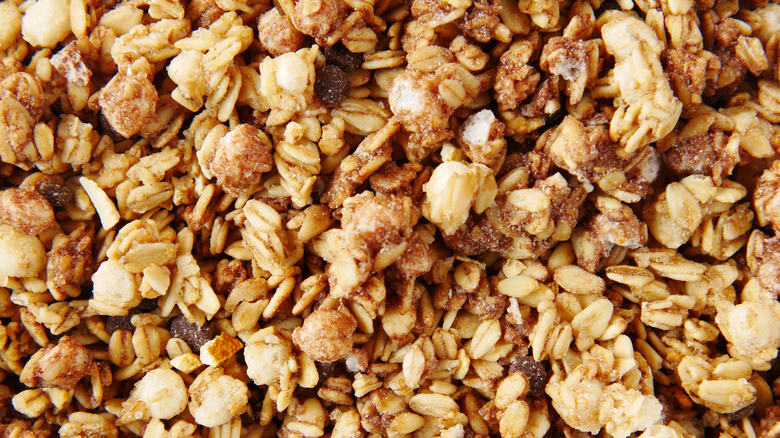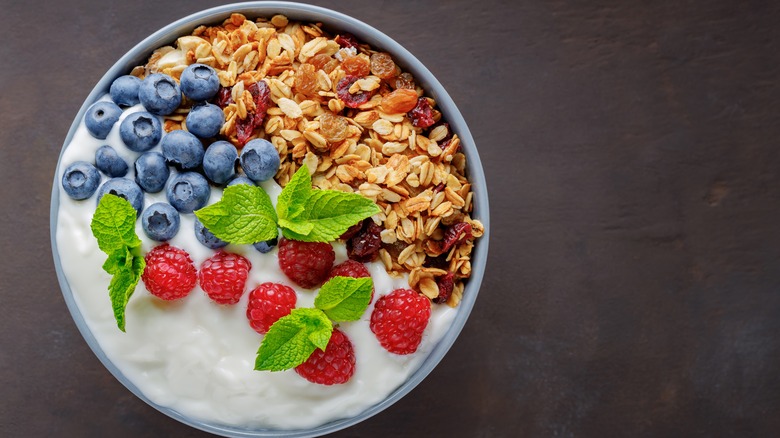A Kellog's Lawsuit Is The Reason We Have 'Granola' Today
The Kellogg Company, more than a century old, has a plethora of achievements to its name. In 1894, W.K. Kellogg first made his now-iconic Corn Flakes. Then, in 1900, he and his brother, Dr. John H. Kellogg, founded what would become Kellogg's.
Originally, Kellogg's sold crunchy, processed grains as delectable breakfast foods. However, it would also go on to sell cereals, such as Apple Jacks, Bran Flakes, Corn Pops, Frosted Flakes, Honey Smacks, Krave, Mini Wheats, Rice Krispies, and Special K — some of which remain as the oldest cereals still on shelves. That's not even including its other breakfast dishes, like Nutri-Grain Bars and Pop-Tarts!
Kellogg's additionally had the honor of feeding the military throughout World War II and astronauts during the moon landing. The corporation has myriad accomplishments to be proud of, not least of which is "granola" itself. All of this began at Dr. Kellogg's Battle Creek Sanitarium, a special place in culinary history.
James C. Jackson invented granula
That's not a typo — "granola" was originally spelled "granula." Granula was the creation of a 19th-century water enthusiast named James C. Jackson. Utilizing his medical degree, Jackson opened two health facilities in his lifetime, where he professed the positive attributes of both water and a graham-cracker-esque breakfast food dubbed "granula." This was somewhat similar to modern granola, but it was made with wheat instead of oats and was tougher — it needed to soak in milk for up to an entire night before it was ready to be eaten. While labor-intensive, it was also the first cold breakfast cereal, predating even Corn Flakes. In fact, in 1878, Dr. Kellogg visited one of Jackson's facilities and was apparently inspired by his granula.
Dr. Kellogg soon after introduced cold cereal to his own health facility, which was called Dr. Kellogg's Battle Creek Sanitarium. His creation, developed in the late 1800s, consisted of cornmeal, flour, and oatmeal, and it was also dubbed "granula." As a result, Jackson sued Dr. Kellogg. By the time the 1890s rolled around, Kellogg's "granula" became "granola" to avoid further legal troubles. Jackson undoubtedly invented granula, but this Kellogg's lawsuit is why we have "granola" today. (Oddly enough, that's not the only Kellogg's suit that changed a breakfast's name.)
Is that really all it took to make granola so ubiquitous, though?
Granola was once part of obscure counterculture
Despite granola's impactful beginnings, it actually lingered in obscurity for quite some time. Kellogg's got started with granola, but it was its other products, marketing, and diversification that made this brand famous. Then, during the 1960s, as Americans' perception of the establishment worsened, the counterculture movement began adopting granola as a healthier alternative to cereals, shunning mainstream products. Layton 'Johnny Granola Seed' Gentry was credited with truly getting the ball rolling, and by the '70s, his freelance granola ventures transformed into a small yet exponentially growing industry.
Heartland Natural Cereal of 1972 is widely considered the first mass-marketed granola product. This signaled a shift in granola's identity, as plastic bags were replaced with cardboard boxes and health stores were beaten out by grocery chains. Even so, Heartland Natural Cereal was marketed as nutritious and nostalgic, which may explain why many folks still view granola that way today. It's possible a lot of this evolution would have stayed the same without Kellogg's. Still, it's curious to think there may have been a world where everyone spelled and pronounced "granola" just a tad differently.


